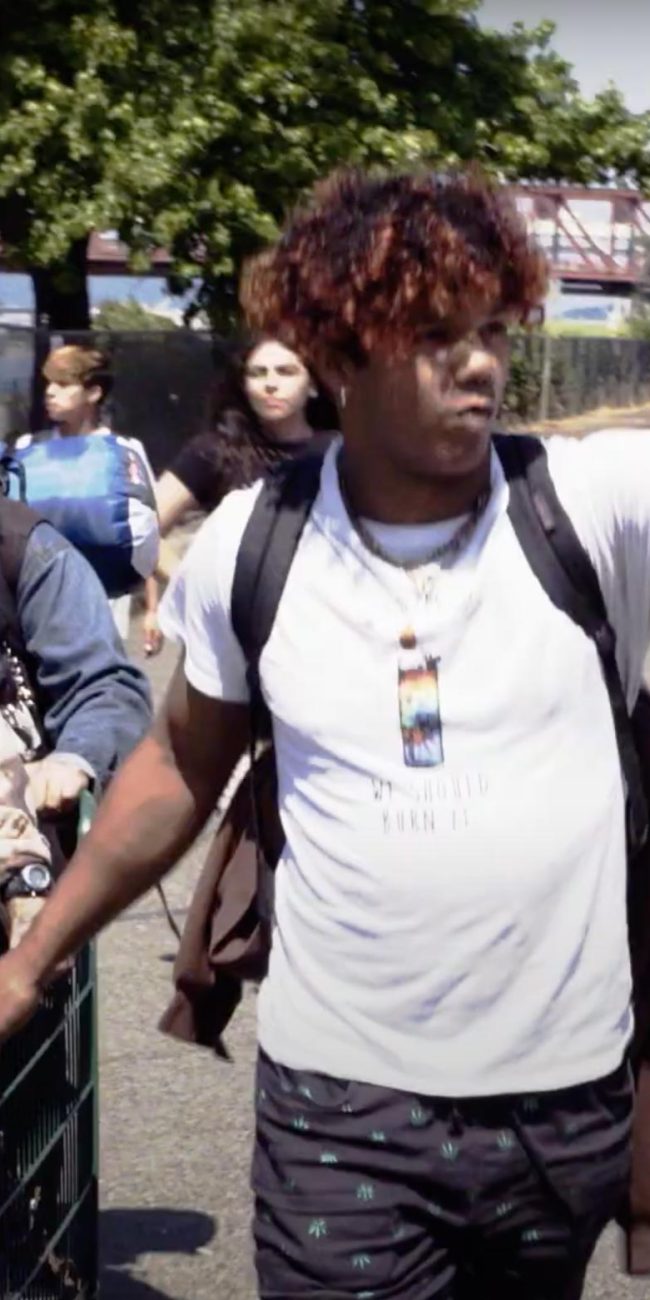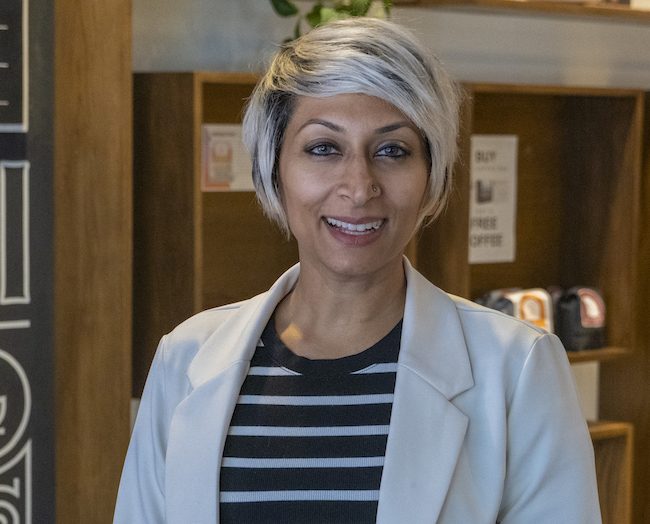A Conversation with Julie Lunde Lillesæter, Marina Garrett & Hanna Senko (AN ARMY OF WOMEN)
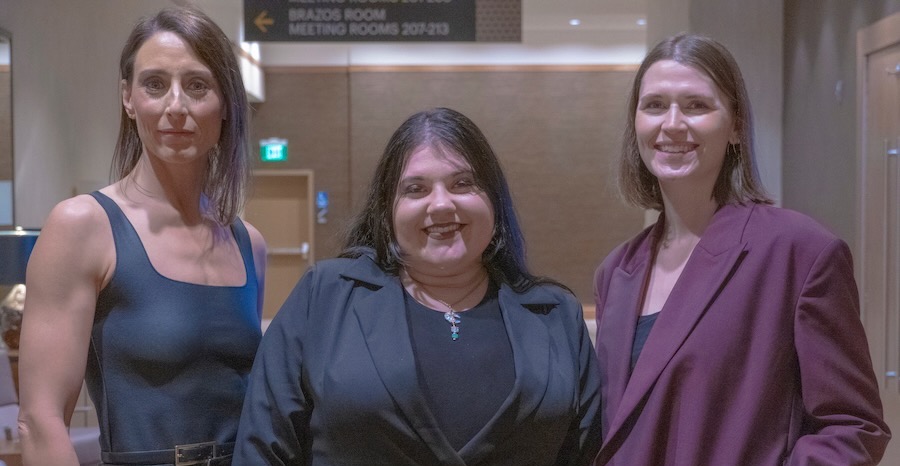
Set in Austin, Texas—the location of its world premiere, at SXSW 2024 (where I reviewed it)—the documentary An Army of Women explores how the local police department and district attorney have failed to prosecute perpetrators of sexual assault and rape over many years. Director and cinematographer Julie Lunde Lillesæter marks her feature debut with a searing takedown of the forces of ostensible law and order, giving the underserved victims their due in front of the camera. Some of the content may be difficult to watch, but it’s all in service of the good news at the end. At SXSW, on March 8 (International Women’s Day), I had the chance to speak with not only Lillesæter, but also two of her subjects—Hanna Senko and Marina Garrett—and here is a transcript of our conversation, edited for length and clarity.
Hammer to Nail: Julie, when did you first start working on this documentary?
Julie Lunde Lillesæter: I first started working on it in 2019. I had lived in Austin for about a year, and when I learned about the lawsuit, at that point it had been going on for almost a year. And so I reached out to the attorneys and they introduced me to Marina and Hanna.
HtN: So it all began with the attorneys, Jenny and Elizabeth.
JLL: Yes.
HtN: And then what was the process like of figuring out who among the plaintiffs would be in your movie?
JLL: At first I spoke with the attorneys and talked to them about whether or not we should do a film, and then they sent out a call to the plaintiff group to ask if anyone wanted to meet with me and learn more. And Marina and Hanna were among those who reached out. And when I met them, I saw that they were doing a lot of work and trying to create change in Austin, and so it made sense for me to follow them and see if they were able to actually force this change.
HtN: So, Hanna and Marina, from your perspective, what was it like being approached to have a film made about this, while the litigation was still in process?
Hanna Senko: It was an honor. It was nice to know that what we were doing was being noticed. Of course, from a personal perspective, there’s a little bit of trepidation around going on film and exposing some very personal aspects of your life, but in the long run, it’s really been an honor, quite frankly, that we’re here, and I’m grateful that Julie took note of what we were doing.
Marina Garrett: Absolutely. I echo a lot of what Hanna said, and I think at that point we had done a few news interviews and things like that, but it really felt like a lot of the media wasn’t paying attention to the lawsuit, so to have Julie see it and realize the importance and reach out to us was a really amazing experience.
HtN: So, Julie, I’m sure you wanted to avoid retraumatizing those who might be reticent to talk about this. What kinds of parameters did you set on yourself in terms of talking about this with your subjects?
JLL: So, for me, it was important to follow the pace of Hanna and Marina, and figure out what they were comfortable with. I think we started out filming a lot more of the advocacy work—being out in the world talking about the cause—and then I think as we got to know each other better, we filmed a little bit more on the more personal side. But it was important for me to not ask about the assaults, for instance. That was not the focus of my film—what the assaults were like—but rather, what it was like to report to the system, and what it was like to try and challenge it legally.
HtN: Hanna and Marina, you’ve both done a lot of speaking about what happened, along with the advocacy work, so what strategies have you both employed to take care of yourselves in that process?
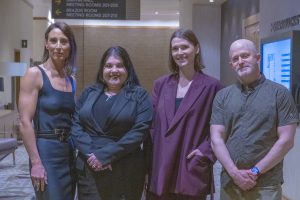
Hanna Senko, Marina Garrett, Julie Lunde Lillesæter and HtNs Chris Reed
MG: I think in the beginning I was not taking care of myself at all, and I think that’s evident throughout the process. I was very traumatized when I started, and honestly, speaking out did help me heal; having people hear my voice helped me heal. But I think having the group of women around me was how I took care of myself. I couldn’t have done it without the support of Hanna, and Mary, and Julie, and the advocates in the community.
HS: For me, how did I take care of myself? I think one of the most important things for me was really just trying to quiet that little voice in my head that was about the fear and the doubts and the anxieties of what could go wrong, or be wrong. And then to just trust the process and trust Julie in the filmmaking. I’m not sure I would’ve said yes to anyone else other than Julie; she really was just super patient and graceful and let us lead … took our lead on it.
HtN: One of the things I really love about the film is the solidarity of everyone within it. Julie, when did you decide to include that lovely sidebar of Jenny and Elizabeth’s wedding as part of the film, as well?
JLL: Yeah, Jenny and Elizabeth…I always knew that I wanted to follow them, as well, because they did so much work, and I was really interested in the legal perspective of the film and understanding the lawsuit through them. And so I got to know them, realized that they were a couple and that they had met through the lawsuit, and to me that was a really beautiful part of the story that showed how they came together because of all these plaintiffs, and it was a beautiful love story that I felt was a testament to the power of this community and these women, and how they all came together to do this.
HtN: I have a question about the Austin Firefighters Association. Why do you think they have taken such an active role in being such great allies? Everyone should be an ally, but why do you think they’ve done this outreach?
HS: So, there was a female firefighter that was assaulted. There was a video camera put up in the shower in the fire station, and she did not receive justice through the process. And so I think their eyes were opened to what women face in these types of crimes, and they really unified behind making change, specifically with the D.A., because I think they were really unhappy with her experience and what she went through, and so they were huge allies for us.
HtN: I think it’s great that that’s what their response was. So, Julie, this is your first feature as a director, but you’ve been doing a lot of filming for a while. You were also the cinematographer. What kinds of challenges did you face as both director and DP [Director of Photography] on this film?
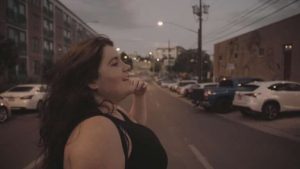
A still from AN ARMY OF WOMEN
JLL: I think doing both the shooting and directing at the same time has pros and cons. I think the good thing was that it was just me, so I could go whenever and didn’t have to call any extra crew. I was very flexible and it allowed me to have a very close relationship with both Marina and Hanna that I don’t think we would’ve had if I always had a cameraperson with me. The downside to it is that you’re quite alone in the filmmaking, and I had to make all the calls, and didn’t have that many people to talk to about what to focus on, or if we should shoot that thing or not.
And so, to me, part of it was a bit lonely, filmmaking-wise, because I didn’t have that other person to talk to and talk through what we filmed and what’s good or what’s not good. And then, of course, it’s always a bit messy to be behind the camera, but then you’re also interviewing, so the camera moves … you see it a bit in the film, I think, where people look in strange directions and all of that. But I would say, all in all, I’m happy I did it this way.
HtN: If there were instances of people looking where they shouldn’t, I didn’t notice it.
JLL: Okay, good. I noticed it. And I’m really tall, so people look up a lot.
HtN: But did you not have somebody recording sound? Were you doing dual-system sound?
JLL: I recorded sound myself.
HtN: So you really were alone.
JLL: Yes. I did have some other people, for the bigger days, like the settlements, but for the most part it was just me.
HtN: Were there any particular narrative challenges that you faced assembling the footage into a coherent through line? It certainly helped that the ultimate outcome was successful, but were there other challenges along the way?
JLL: We filmed for, I think, nearly four years. The legal battle went on for a long time, there were a lot of ups and downs, and I found it really hard to know what to include and what not to include of the whole legal process. I knew it had to be understandable for people who didn’t know the system. I’m from Norway, and it’s going to air in Scandinavia, and Germany, and France, so I knew that it had to make sense to an international audience. And so it was a challenge to simplify it. And there were loads of things I wish we could have had in the film that we were not able to include, to keep it simple and coherent and also emotionally powerful.
HtN: Hanna and Marina, were there things that perhaps you expected to see in the film that didn’t end up there? You lived through the filming for four years; did anything surprise you in the finished film?
MG: I don’t think it surprised me; I think it really captured the story as a whole. For me, I was very interested in the legal side, as well, and have decided to go to law school through this process, so of course there are a lot of the legal intricacies that I love, that I just know wouldn’t have made it in, and would not have made sense. So, that’s the only thing, but I understand. But the rest of it, I think that it was captured so well, the whole story, and really just shows what happened to us during those years, on a big-picture level.
HS: For me, it’s very much the same. To echo Julie, really, I mean there’s just so much footage of her 4+ years. I think she’s done a great job of being able to make it coherent to an audience, and also sound true, at least from my seat. But there are so many different aspects of the story that aren’t understood. But it wasn’t expected, I don’t think, to go … it’s just an 80-minute film, after all, and I think she’s really captured what needed to be captured.
HtN: How is the new D.A., José Garza, doing? There was a lot of hope about him, and he did settle the suit, but is he as progressive on these issues as we had hoped he would be?
MG: I think that being a district attorney is a difficult job, and I think that the reality is that when José got into office there were a lot more things on his plate than just sexual assault. I do think that he hired a lot of really great advocates in the community, and did bring a lot of the survivor voice and perspective to the office, but I think that there’s just a lot on his plate to … it just wasn’t as much progress as I think we would’ve initially hoped, but I know that he just recently won the primary, and so I hope that with another term he can really make some additional progress.
HS: I think we have a real advocate with José. I think he means well and is really well-intentioned. You will probably never hear me say that I’m satisfied with what any district attorney or law-enforcement agency is doing, because I always feel like there’s a next level. Because there’s so far to go. And so, I think José and his team mean well, and are doing their best, but I do believe that there’s a lot further that we need to take it.
HtN: Did I correctly read at the end of the film that you are working with the Austin Police Department? How is that going?
HS: It’s actually going incredibly well. I serve as a consultant project manager, really leading the implementation of the reform efforts coming out of the lawsuit, as well as a third-party audit that was conducted. And so, it’s actually been one of the more rewarding parts of this whole journey, just because I’m actually seeing changes happen and get implemented. I’m working with many of the same advocates that were part of the whole movement for years, because it’s really a collaborative effort with law enforcement, and many of the advocates in the community, and partner agencies. It’s been really incredible. The work’s slow, but it’s heading in the right direction.
HtN: And Marina, what about your law-school plans?
MG: I’m applying to law school.
HtN: What kind of law do you hope to do?
MG: So, I currently work as a legal assistant in Dallas, and I actually work for a real-estate team, which I do enjoy, and I absolutely love my team. So, yeah, I don’t know if I will go into more public-interest law, or if I will do some real estate and stay with my team, but I know that I will always … Jenny and Elizabeth, in many ways, they saved my life and helped me heal, and that was through their pro bono efforts. They weren’t always this type of attorney. And so I know that I will always keep pro bono and helping people at the core of my career as an attorney.
HtN: Well, thank you all for talking to me on this International Women’s Day. I wish you all good things for the film.
JLL: Thank you so much.
HS: Thank you for this interview, it was great.
MG: Yes, it was a great interview. Thank you.
– Christopher Llewellyn Reed (@ChrisReedFilm)
2024 SXSW Film Festival; Julie Lunde Lillesæter; An Army of Women








